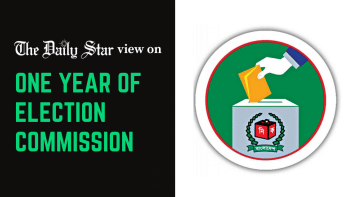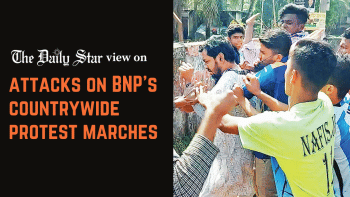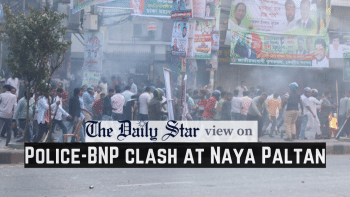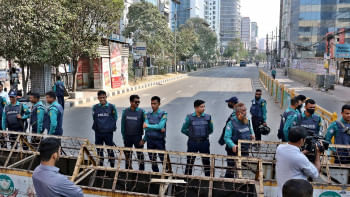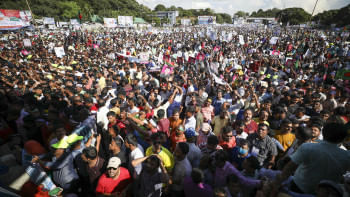Advocate Sultana Kamal, a human rights activist and the founder president of Manabadhikar Shongskriti Foundation, speaks with Eresh Omar Jamal of The Daily Star about Bangladesh's 12th parliamentary election and its ramifications for the country's political and governance landscapes.
With BNP boycotting the January 7 election, and some of the parties who participated in it bargaining with Awami League for seats beforehand, how would you describe the latest election?
I have been giving my comments on the election which was held on January 7 for months. Now that it has already happened, to me, the event of January 7 cannot be called an "election" by any definition, let alone "a participatory election." We all know the arrangements for distribution of seats between the contesting parties were settled amicably beforehand. The election was held in the name of fulfilling a constitutional obligation, which in reality turned out to be a ritual participated by friendly contestants.
By boycotting the election, didn't BNP give AL a free ride? One could argue that the ruling party created a repressive environment for the opposition prior to the election, but by terming its movement as a movement to "oust the government," what sort of a reaction did BNP expect?
Yes, BNP did.
As I kept saying since the 2014 election, BNP made a big (fatal for them) mistake by not participating in the election. True, they did take part in the 2018 election. But by then, they had already lost their position as a political party strong enough to influence the national political psyche. Insisting on terming their movement as a movement to "oust the government," without posing a viable alternative to the nation, was nothing but a blunder on their part. BNP must have expected considerable support from the general people in the context of Awami League's extremely repressive rule, lack of good governance, and democratic deficit. But its failure to provide a convincing picture of a better future did not yield the expected result for BNP.
Given the election results, who do you expect will be the parliamentary opposition? Will that also be decided by AL? And what effect will all this have on the future of Bangladesh's politics?
It is obvious that there will be no effective parliamentary opposition for at least the next five years as, without a few exceptions, all in the parliament are Awami League's people. It's an open secret that non-Awami League contestants were not only allowed to participate in the election at the wish of the AL leader, their winning a seat, too, was dependent on the same factor. An opposition perhaps will be declared officially as a matter of rule. But there is no reason to believe that it will be without AL's knowledge. I am afraid I don't feel very optimistic about Bangladesh's future under the given condition. However, I will definitely be happy if I am proved wrong.
How would you rate the performance of the Awami League government over the last five years? And do you expect any changes this term?
The Awami League government over the last five years concentrated on heavy, visible infrastructural development, in which they showed considerable success. It was during this period that Bangladesh qualified to graduate from being a least-developed country to a developing one. It has also made some progress in attaining a few of the SDG goals in the fields of women's empowerment, enrolment of female students, extending community health services, etc. Bangladesh's GDP grew impressively. The number of ultra-rich in society increased at unprecedented speed. But at the same time, according to eminent economists, the country's economy plunged into uncertainties. This, compounded with a repressive, exploitative, and unethical political atmosphere, created insecurity for people in social, public, and personal spheres. Though Awami League consistently claimed to have run the country according to the spirit of our Liberation War and the ideals of Bangabandhu, ironically, strengthening of democracy, rule of law, zero tolerance for corruption, and respect for human rights of all, and efforts to create a common humane social culture, seem to have disappeared from their agenda.
As said by many, over the past few years, Bangladesh has been divided into two different "societies." One for the rich and the advantaged, the other for the disenfranchised and disadvantaged. This directly contradicts with our constitutional directives as well as what we stated in our Declaration of Independence. In short, Awami League rulers have failed to rise up to their own declared ideals.
However, during the election campaign, Awami League's leader Sheikh Hasina urged the people of Bangladesh to look at their mistakes leniently. I hope the Awami League government this time will take care not to repeat their past mistakes, which go against the spirit of our Liberation War and create an atmosphere of crisis for democracy and good governance.
Follow The Daily Star Opinion on Facebook for the latest opinions, commentaries and analyses by experts and professionals. To contribute your article or letter to The Daily Star Opinion, see our guidelines for submission.



 For all latest news, follow The Daily Star's Google News channel.
For all latest news, follow The Daily Star's Google News channel. 